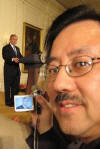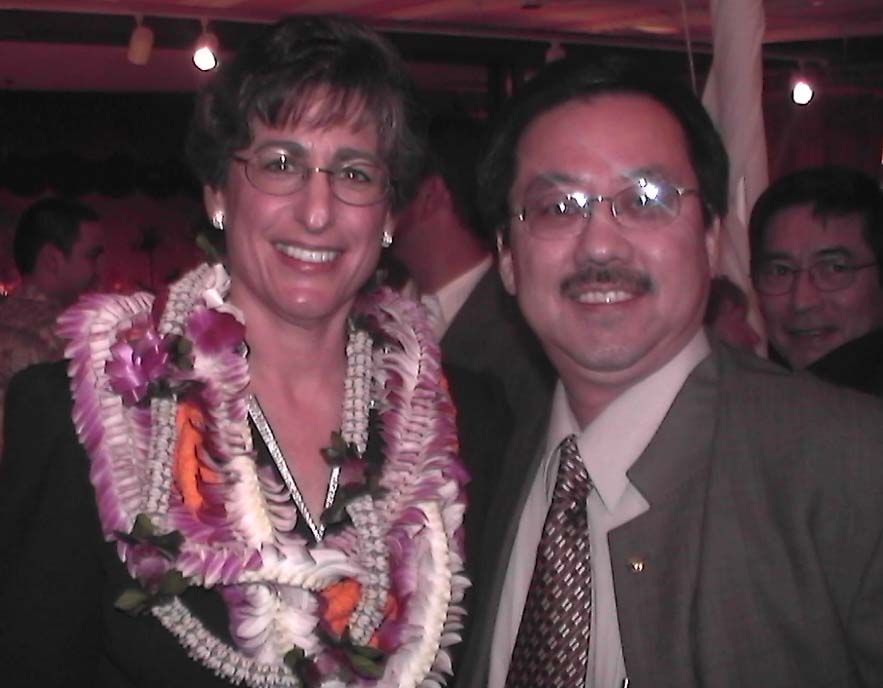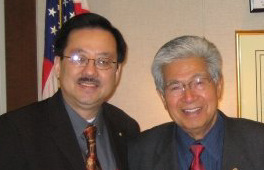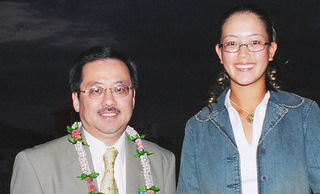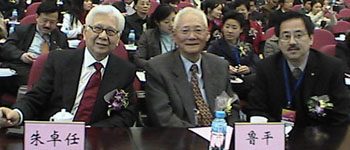|
Newsletter
Seminar Material




Biz:
China
Hong
Kong Hawaii


What people
said about us

China
Earthquake Relief
Tax &
Government
Hawaii Voter Registration
 Biz-Video
Biz-Video
 Hawaii's
China Connection Hawaii's
China Connection

 CDP#1780962
CDP#1780962

 Doing Business in
Hong Kong & China
Doing Business in
Hong Kong & China
| |

http://www.hawaiibusiness.com/Hawaii-Business/November-2010/Nonprofit-Boards-Confused-or-MIA/
Nonprofit Boards: Confused or Missing in Action M.I.A. 非營利組織董事會:混淆或丟失在行動
Businesspeople who volunteer to serve
often fail to fulfill their duties, say nonprofit leaders 商人誰志願服務往往不能履行其職責,非盈利性的領導人說
BY
DENNIS HOLLIER
“When I look back on it,” says John
D., the former executive director of a small but prominent nonprofit in
Honolulu, “the board of directors just really didn’t understand what their
role was.” He pauses for a moment, his face assuming a pained expression.
“In some cases, they made their job more difficult by micromanaging the staff.
But they also didn’t take care of their basic responsibilities, like raising
funds or strategic planning. In the end, they made it impossible for me to do my
job.” “當我回頭看它,說:”約翰
D,前執行董事,一個小而突出的非盈利在檀香山,“董事會只是真的不明白他們的角色了。”他停頓了片刻,他的臉上痛苦的表情假設。
“在某些情況下,他們使他們的工作更加困難微觀的工作人員。但是,他們也沒有照顧他們的基本責任,如集資或戰略規劃。最後,他們讓我無法做我的工作。“
His is a common sentiment among the
leaders of Hawaii’s nonprofits, particularly those from small- and mid-sized
organizations. Many executive directors, CEOs and even some maverick board
members say privately that their boards are poorly prepared, misinformed and
often burdened with damaging misconceptions about their roles. The result is a
lack of clarity about the relationship between the board and the executive
director, and about their respective responsibilities. Inevitably, this
confusion leads to conflict and limits nonprofits’ effectiveness. And if you
listen to Hawaii’s community of executive directors, it’s the boards of
directors that are mostly to blame. 他是一個共同的情感領導人之間的夏威夷的非營利組織,特別是來自小型和中型組織。許多執行董事,首席執行官和董事會成員甚至一些標新立異私下里說,他們的董事會是準備不足,往往誤導和損害的誤解背負著自己的角色。其結果是缺乏明確的關係有關董事會和執行董事,以及他們各自的職責。不可避免的是,這種混亂會導致衝突和限制的非營利組織的成效。如果你聽夏威夷的社區執行董事,這是董事會董事的大多是難辭其咎。
It’s true, some nonprofit experts are
more circumspect. For example, Holly Henderson, who, as executive director of
the Weinberg Fellows and Castle Colleagues, has helped train hundreds of
executive directors and board members in Hawaii, believes these problems are an
inevitable part of the evolution of a nonprofit. “What I see a lot of,”
Henderson says, “are boards that aren’t working anymore. And although there
are individuals who want to blame somebody, sometimes it’s just the same as
blaming a kid of for growing out of a pair of shoes. Because, what works at one
point in an organization’s life doesn’t work at another point. And it’s
not necessarily anybody’s fault.” 這是真的,一些非營利專家更為謹慎。例如,冬青亨德森,誰擔任執行主任,研究員和城堡溫伯格的同事,已幫助培訓了數百名執行董事和董事會成員在夏威夷,相信這些問題是不可避免的一部分,一個非營利性的演變。
“我看到了許多,”亨德森說,“是不屬於議會工作了。儘管有個別人想責怪誰,有時它只是一個孩子一樣指責為生長出一對鞋。因為,在一個點什麼作品在一個組織的生活並不工作在另一點。這也不一定任何人的錯。“
She also notes that business people make
up the bulk of nonprofit board members, and that they’re volunteers, often
taking valuable time away from their companies and families. “You have people
who want to help the community by volunteering their time,” she says, “and
they’re not happy to be told they’re not doing a good job.” 她還指出,商界人士組成的非盈利性的大部分董事會成員,而且他們是志願者,經常服用寶貴的時間遠離自己的公司和家庭。
“你的人誰願意幫助他們的社區的志願服務時間,”她說,“他們不樂意告訴他們沒有做一個好工作。”
Henderson’s perspective draws on the
work of the nonprofit expert Karl Mathiasen, who divided nonprofits and their
boards into three stages of development: 亨德森的角度吸取了工作的非盈利性專家卡爾
Mathiasen,誰分裂非營利組織和其董事會的發展分為三個階段:
- Small, informal “organizational
boards,” dominated by the nonprofit’s founders; 小型的,非正式的“組織委員會,”佔主導地位的非營利組織的創始人;
- Larger, more independent “governing
boards” that begin the process of formalizing rules and procedures; and 更大,更獨立的“管理委員會”的過程中開始正式的規則和程序;
- Large, sophisticated “institutional
boards,” replete with standing committees and many of the attributes of a
for-profit corporation. 大型,精密“機構議會”,充滿了常設委員會和眾多的屬性營利性公司。
 |
|
Holly Henderson, who helps train nonprofit leaders, says conflicts
arise when nonprofits evolve, but their boards
do not change with
them.
Photo: Rae Huo
|
According to Mathiasen, these transitions,
particularly from an organizing board to a governing board, are often fraught
with conflict. To make matters worse, as Henderson points out, executive
directors and board members may evolve at different rates. This, she says, is
why so many executive directors complain about their boards. 據 Mathiasen,這些轉變,尤其是從一個組織委員會,理事會,往往充滿了衝突。為了使事情變得更糟,因為亨德森指出,執行董事和董事會成員可以以不同的速度發展。這一點,她說這是為什麼這麼多的執行董事抱怨他們的董事會。
To some extent, it was always so. Several
years ago, the Hawaii Community Foundation did a survey of executive directors
to understand why turnover was so high among nonprofit leaders. “The No. 1
complaint that came out was the board,” says Christine van Bergeijk, the
foundation’s vice president for programs. “There was really a great deal of
sentiment that executive directors were all by themselves, and the board members
were merely cheerleaders. The EDs said they needed the board to roll up their
sleeves and do some of the hard work.” Board members, in other words, aren’t
living up to their end of the bargain. 從某種程度上說,它總是如此。幾年前,夏威夷社區基金會做了一個調查執行董事明白為什麼成交量如此之高,在非營利的領導人。
“1號投訴出來的是董事會,”克里斯蒂娜說麵包車
Bergeijk,該基金會的副總裁方案。 “真有很大的情緒,執行董事都是由自己,董事會成員只是啦啦隊。
EDS的董事會表示,他們需要捲起衣袖,做一些努力。“董事會成員,換句話說,不辜負他們的最終的討價還價。
Of course, that’s only one side of the
problem. Executive directors, for example, deserve a share of the blame. Many,
particularly if they founded the organization, preserve their power by keeping
their board members in the dark. And there’s a whole other story to be told
about the level of professionalism among the leaders of the nonprofit community.
So, the incompetence of board members isn’t the only problem facing
nonprofits. “It’s true that our board is kind of passive,” says a board
member from a small educational organization, “but I think the members would
work with the executive director if she really needed help.” 當然,這只是一個方面的問題。執行董事,例如,值得一分擔責任。許多人,尤其是當他們成立組織,維護他們的權力,維持其董事會成員在黑暗中。還有的完全是另外一個故事,被告知專業水平的領導人之間的非盈利性社會。因此,不稱職的董事會成員是不是非營利組織面臨的唯一問題。
“的確,我們的董事會是一種被動的,”一位董事會成員從一個小的教育機構,“但我認為成員將與執行董事,如果她真的需要幫助。”
It’s certainly telling, though, that
although many executive directors were willing to share their complaints, none
were willing to do so on the record, citing a fear of reprisals from their board
or the inability to get nonprofit jobs in the future. Many also worried that
public criticism would damage their ability to raise funds. For that reason,
we’ve disguised the identities of most of the executive directors cited in
this article as well as the organizations they run. Of course, this anonymity
makes it difficult to gauge the validity of their complaints. But the striking
uniformity of their criticism gives them credence. 這當然說,儘管如此,儘管許多執行董事願意分享他們的投訴,沒有一個人願意這樣做的記錄,理由是擔心報復他們的董事會或無法得到非盈利職位的未來。許多人還擔心公眾的批評會損害他們的能力籌集資金。出於這個原因,我們已經變相的身份大多數執行董事這篇文章中提到的組織以及它們運行。當然,這使得匿名很難衡量其有效性的投訴。但其驚人的一致批評,給予他們信任。
For this story, we interviewed the
executive directors, staff members, and members of the boards of more than a
dozen nonprofits. We also spoke with some of Hawaii’s most respected nonprofit
experts and consultants. Over and over, they brought up the same tales of board
members who didn’t understand their roles or failed to embrace their
responsibilities. Here are the three major areas where Hawaii’s nonprofit
boards come up short: 對於這個故事,我們採訪了執行董事,職員,以及成員的木板十幾非營利組織。我們還採訪了一些夏威夷最受尊敬的非盈利性的專家和顧問。一次又一次,他們提出了同樣的故事,董事會成員誰不明白自己的角色或沒有接受他們的責任。這裡有三個重要領域夏威夷的非營利上來短板:
 |
|
This chart from the Aloha United Way shows the responsibilities
of a nonprofit organization .
|
Board Development 董事會發展
“All my board members are just friends
of one another. For ‘board orientation’ all they get is a pat on the back
and a copy of our last annual report.” —
Noelani K., executive director of a social services provider. “我所有的董事會成員彼此只是朋友。對於'板取向所有他們得到的是一拍背部和副本,我們最後一次年度報告。“ - Noelani 光,執行董事,一個社會服務的提供者。
“Too
often, board members treat meetings like a social club. They don’t seem to
take the work or the mission seriously.” —
Tom K., executive director of a nonprofit intermediary organization. “很多時候,董事會成員會議,像對待一個社交俱樂部。他們似乎沒有採取認真的工作或任務。“ - 湯姆光,執行董事,一個非營利性中介組織。
“We’ve had the same chairman of the
board for 10 years.” — Mary
N., CEO of a cultural organization. “我們也遇到了同樣董事局主席10 年。” - 瑪麗全,總裁一個文化組織。
“The
board members absolutely refuse to attend any kind of board training. Even
though none of them have any experience, they all say they already know
everything there is to know about how to run a nonprofit.” —
Amy L., executive director of an environmental organization. “董事會成員完全拒絕參加任何種類的船上培訓。儘管他們沒有任何經驗,他們都表示,他們已經知道了你需要知道如何運行一個非營利組織。“ - 與 Amy L.,執行董事一環保組織。
It starts by picking the right board
members. All too often, executive directors complain, new members are selected
because they’re friends of other members. Except on some large institutional
boards, little strategic thinking goes into identifying candidates and courting
them to see if they’re a good fit. The result is often undersized, homogeneous
boards that lack the skills needed to govern an organization responsibly. 它首先通過選擇合適的董事會成員。很多時候,執行董事抱怨,選擇新成員,因為他們是朋友的其他成員。除了一些大型機構議會,小戰略思維進入確定候選人,拉攏他們,看看他們是一個不錯的選擇。結果往往是不足的,均質板缺乏所需的技能來管理一個組織的責任。
This also poses problems for potential
board members. For business executives contemplating joining the board of a
nonprofit, it’s not simply a matter of whether you want to serve, but whether
you’re a good fit. Amy Hennessey, a former board member for Community Links, a
Honolulu organization that served as a sort of incubator for nonprofits until it
closed earlier this year, says that means asking questions. “You want to ask
about their expectations: ‘What’s your fiscal structure? Are you in
financial difficulty? What’s your plan for the future? What are your
expectations for my involvement on this board? How much of my time do you really
need? In other words, what do you need from me in terms of time, money,
intellect – all that?” 這也構成潛在的問題,董事會的成員。對於企業高管加入董事會考慮的一個非營利組織,它不是簡單的事您是否需要服務,但不管你是一個不錯的選擇。艾米亨尼西,一前董事會成員,社區聯繫,在檀香山的一個組織,作為一個非盈利樣的孵化器,直到它關閉今年早些時候說,這意味著提問。
“你要問他們的期望:'什麼是你的財政結構?你在財政困難嗎?你對此有何計劃未來?你有什麼期望,我參與這個論壇?我的時間多少,你真的需要?換句話說,你有什麼需要我在計算時間,金錢,智力
- 這一切?“
Of course, those questions rarely arise
from new board members. Even worse, board members, even after they’ve been
selected, are rarely told what’s expected of them or given an adequate
orientation to the board’s duties. And, as one executive director pointed out,
“There’s never any discussion of the division of labor between the board and
the ED.” Clearly, there needs to be a more thorough education of board
members. 當然,這些問題很少出現的新的董事會成員。更糟的是,董事會成員,即使他們已經被選中,也很少告訴什麼期望他們或給予適當的方向,以董事會的職務。而且,正如一位執行主任指出,“有從來沒有任何討論的分工董事會與教育署。”很明顯,需要有一個更徹底的教育董事會成員。
But, as Henderson points out, board
members aren’t necessarily going to embrace this education. “These are often
prominent people,” she says. “A lot of them don’t take well to the idea
that they need training. In fact, I rarely use the word ‘training’; I
usually say ‘briefing.’ ” Whatever you call it, though, board training
should be an ongoing process, not just for new members. Henderson gives the
example of board rotation, the use of term limits to systematically replace
board members. “One of the wonderful things about board rotation is it gives
you the opportunity to get the board together and to do some orientation.
Ostensibly, it’s for new board members, but long-serving board members can
hear it as well.” 但是,正如亨德森指出,董事會成員並不一定要接受這種教育。
“這些通常是突出的人,”她說。 “很多,他們不採取很好的想法,他們需要培訓。事實上,我很少用這個詞'訓練',我常說'簡報'。“無論你怎麼稱呼它,但是,船上訓練應該是一個持續的過程,不只是為新成員。恆基兆業為例給出了板旋轉,使用期限的限制,有系統地取代董事會成員。
“一個美好的事物有關的板旋轉它讓你有機會得到董事會一起做一些方向。從表面上看,它是為新的董事會成員,但長期服務的董事會成員能聽到它。“
 |
|
Robbie Alm, VP at HECO and a member of several nonprofit
boards, says most boards offer only a basic
orientation for
new members. Photo:
Olivier Koning
|
In most cases, though, there’s little or
no orientation, and both executive directors and board members can share in the
blame. “What I’ve seen a lot of, over the years,” says Robbie Alm, “is a
failure on the part of everybody – executive directors, board members, board
chairs – to really work out and understand what their roles are. It’s almost
as if we assume we know, so we never really talk it out.” In the nonprofit
literature, this is sometimes referred to as “blurred roles.” A board member
from one local nonprofit put it another way: “Nobody knows a damned thing.” 在大多數情況下,雖然,幾乎沒有或根本沒有方向,都執行董事和董事會成員可以共享的責任。
“我見過很多,多年來,說:”羅比阿爾姆“,是一個失敗的一部分,每個人
- 執行董事,董事會成員,董事會主席 - 制定並真正理解他們的角色。這就像我們假設我們知道,所以我們從來沒有真正談論它。“在非營利文學,這有時被稱為”模糊的角色。“董事會成員從一個地方非營利換一種方式:”沒有人知道一該死的事情。“
Not everyone believes that boards are the
problem. Tim Johns, CEO of Bishop Museum, for example, says there’s been a
trend toward more and better training, so board members today have a better
understanding of their roles. (It’s worth noting, though, that most of
Johns’ board experience has been on mature, institutional boards.) He does
note, however, that the pool talent in a community of this size is limited.
“We do have a lot of nonprofits, so we may not have as many potential board
members as you have in a larger community.” As a result, he says, people might
be sitting on boards earlier in their careers. “If you were in San Francisco
or Chicago, you might not be sitting on that type of board at that point in your
career.” 並非所有人都認為,議會是這個問題。蒂姆約翰首席執行官主教博物館,例如說,有一種趨勢是朝著更多更好的培訓,使董事會成員今天有一個更好地了解自己的角色。 (值得一提的,雖然,大多數約翰的董事會已經成熟的經驗,體制板。)他沒有注意,但是,人才的池社區這種規模是有限的。
“我們確實有很多非營利組織,所以我們可能不會有很多潛在的董事會成員為你有一個較大的社區。”因此,他說,人們可能會坐在議會早在其職業生涯。
“如果你是在舊金山或芝加哥,你可能不會坐在該類型的電路板在該點在你的事業。”
Fundraising 籌款
“When
I started our first capital campaign, my board chair said to me, ‘Why do I
have to fundraise, isn’t that why we hired a development director?’ ” —
Mary N., CEO of a cultural organization. “當我開始了我們的第一資本的運動,我的董事會主席對我說,'為什麼我要募捐,難道這不正是我們聘請了發展的導演嗎?'” - 瑪麗全,總裁一個文化組織。
“When I tell the board that funders
often require 100 percent board participation, they say, ‘Isn’t our time
enough? We’re all professionals; our time is worth something.’ — John D., executive director of a
human services agency. “當我告訴董事會,出資者往往需要百分之百板的參與,他們說,'不是我們的時間夠嗎?我們的所有專業人員,我們的時間是有價值的。' - 約翰
D,執行董事一人的服務機構。
“Several
of my board members actually told me they would never ask their friends to
support our agency; it would be too embarrassing.” —
Amy L., executive director of an environmental organization. “一些董事會成員實際上我告訴我,他們從來不問他們的朋友來支持我們的機構,那將是太尷尬。” - 與 Amy L.,執行董事,一個環保組織。
“Our
board chair said flatly he won’t donate, won’t raise funds, and won’t
quit.” —
Mike T., CEO of an arts group. “我們的董事會主席說,他斷然不會捐贈,籌集資金將不會,也不會退出。” - 麥克噸,一個藝術團體的 CEO。
Money is king. And for most nonprofits,
fundraising is the single most important responsibility of the board of
directors. That’s because it almost always takes cash for organization to
accomplish its mission. It’s true that board members are often recruited for
other reasons – financial or legal skills, for example, or cultural or
technical knowledge – but these attributes are rarely sufficient. A board
member’s time and talent are useful, of course, but they don’t pay the rent
or insurance, they don’t cover the salaries and benefits of employees, and
most importantly, they don’t pay for food for the hungry, educational programs
for the environment, medical treatment for the sick, or any of the countless
other programs that fall within the missions of Hawaii’s nonprofits. That
takes cash, says van Bergeijk of the Hawaii Community Foundation. And it’s the
board members’ role to donate or, better still, raise that cash from the
community. 金錢是王。和大多數非營利組織,籌款是唯一最重要的責任的董事會。這是因為它幾乎總是需要很多的資金為組織完成其使命。這是真的,董事會成員往往招募其他原因
- 財務或法律技能,例如,或文化或技術知識 - 但這些屬性是不足以。董事會成員的時間和人才是有用的,當然,但他們不付房租或保險費,不支付員工工資和福利,最重要的是,他們不買食物的飢餓,環境教育方案,為病人就醫,或任何其他程序的無數屬於特派團夏威夷的非營利組織。那需要很多的資金,說麵包車
Bergeijk的夏威夷社區基金會。它的董事會成員的角色,捐贈或者更好的是,提出這一現金社會。
“I think the prevailing expectation
today,” van Bergeijk says, “is that, if you’re on a board, you must make
sure the organization has the resources they need to do the job. That equals
fundraising. It shouldn’t be only fundraising, but that’s the prevailing
expectation. If you’re on a board, you’ve got to help raise money. And not
everybody’s cut out to do that.” “我認為當時的期望的今天,”麵包車
Bergeijk 說:“是,如果你對一局,你必須確保組織有資源,他們需要做的工作。等於籌款。它不應該只是募款,但那是當時的期望。如果你在一局,你一定要幫助籌集資金。而且不是每個人都切出這樣做。“
This judgment is nearly universal among
nonprofit professionals. And yet the board members of many nonprofits often fail
to participate in fundraising in any meaningful sense, leaving it to the
executive director or to one or two more committed board members. Christine
Valles, a member of numerous nonprofit boards herself, and owner of Silver
Lining Consulting, a company that advises nonprofit organizations, believes this
problem, like many of those facing nonprofit governance, is another outcome from
how board members are recruited in the first place. No one tells them what’s
expected of them. 這幾乎是普遍的判斷是在非營利性的專業人士。然而,董事會成員很多非營利組織往往不能參加任何真正意義上的籌款,把它留給執行董事或一個或兩個更致力於董事會成員。恭
Valles 公司,成員眾多非營利板自己,和老闆西爾弗利寧諮詢,這是一家非營利組織建議,相信這個問題,像那些面臨許多非營利治理,是另一個結果從董事會成員如何被招募擺在首位。沒有人告訴他們什麼是他們的預期。
“It has to be clear to the new board
member that they’re responsible for fundraising,” Valles says. “That’s
universally agreed upon in the nonprofit world. They have to provide some means
for the financial stability of the organization. But that part is really
underplayed when board members are recruited. No one takes the time to say,
‘You know, you’re going to have to take the lead at raising money. You’re
going to have to make a personal donation, and you’re going to have to ask
your friends for their support.’ Even though that’s simply saying what
boards do. You’ve got to say, ‘As board members, we’re all responsible for
fundraising. So if you’re not actively asking people to give money, you
probably shouldn’t be on a board.’ ” “它必須清楚地向新的董事會成員,他們負責籌款,”Valles的說。 “這是普遍商定的非盈利性的世界。他們必須提供一些方法,為金融穩定的組織。但是,這部分實在是輕描淡寫,當董事會成員招募。沒有人花時間說,'你知道嗎,你將不得不帶頭在籌集資金。你將不得不作出個人的捐贈,以及你將要問你的朋友們的支持。'雖然這只是說什麼板做。你得說,作為董事會成員,我們都負責籌款。所以如果你不主動要求人們給的錢,你可能根本不應該在電路板上。“
This reliance on the board for fundraising
isn’t universally true. Many organizations that provide social services, for
example, rely mostly on government contracts for their funding. Other nonprofits
depend largely on grants, either from government sources or from private
foundations. And because the agency staff usually writes and prepares grant
proposals, that relieves the board of some of its responsibility to raise funds.
這依賴於董事會籌款並非普遍如此。許多組織提供社會服務,例如,主要依賴政府合同為他們提供資金。在很大程度上取決於其他非營利組織資助,無論是來自政府或私人基金會。而由於機構的工作人員通常寫,並準備給予的建議,即減輕了它的一些董事會負責籌集資金。
It’s worth noting, though, that many
private foundations and wealthy individuals will not support an organization
unless every board member has contributed money. And the vast majority of
Hawaii’s 6,000 or so 501.c3 nonprofit organizations depend on financial
support from the community for their survival. In some ways, that’s the theory
of having a board in the first place: to provide a link to the community, a way
to ask the public for its support. 值得一提的,雖然,很多私人基金會和富有的個人將不支持,除非每一個組織的董事會成員作出了貢獻的錢。而且絕大多數夏威夷的6000左右501.c3非營利組織依賴於金融支持,從社會對他們的生存。在某些方面,這就是有一板理論擺在首位:提供一個鏈接到社區,一種方式,要求公眾的支持。
At large nonprofits with institutional
boards, this concept is generally (though not universally) understood. One of
the reasons the boards of organizations like the Aloha United Way or the Easter
Seals are so large (Easter Seals Hawaii, for example, has more than 30 board
members) is to spread out the burden for raising funds. In fact, new board
members are often selected as much for their ability to attract financial
support as for any contacts or skills. This is why most institutional boards try
to attract bank executives as members. Robbie Alm, vice president of Hawaiian
Electric Company, and a board member for more than 20 nonprofits over the years,
points out that senior business executives recruited this way usually understand
their role. 非營利組織與機構在大板,這個概念通常(雖然不普遍)理解。其中一個原因是議會的組織,如聯合國阿羅哈方式或復活節海豹是如此之大(復活節密封夏威夷,例如,有30多個董事會成員)是傳播了籌集資金的負擔。事實上,新的董事會成員往往選擇盡可能多的能力,吸引金融支持的接觸或技能。這就是為什麼大多數機構議會設法吸引銀行高管為成員。羅比阿爾姆副總裁夏威夷電力公司和董事會成員超過
20多年來的非營利組織指出,高級業務管理人員招聘這種方式通常理解的作用。
“Certainly, many of the large nonprofits
are very deliberate in their efforts to do that,” Alm says. “And it works.
If I agree to go on the board of an organization, not only am I going to give,
but most likely my company will have a table at that fundraiser dinner, that
we’ll be at that luncheon or attend that ball.” “當然,許多大型非營利組織都非常謹慎,努力做到這一點,”阿爾姆說。
“它的作品。如果我同意去在黑板上的一個組織,我不僅要給,但最有可能我公司將有一個桌子上吃飯的募捐活動,我們將在該午餐或參加那個球。“
The problem is that the board members of
smaller and mid-sized organizations often fail to make that assumption. These
nonprofits are frequently stuck at the organizing board stage of their
evolution, and their members are either unable or unwilling to actively raise
funds. 問題是,董事會成員較小,中型企業往往不能作出這樣的假設。這些非營利組織經常停留在他們的組織董事會階段的演變,其成員是無法或不願積極籌措資金。
The solution is clear. Executive directors
say their nonprofit boards need to be much more engaged in the organization’s
fundraising. Members should donate according to their means and actively solicit
donations from their friends and contacts. Holly Henderson offers perhaps the
best advice for potential board members: “Pick an organization doing something
you’re passionate about. That way, you won’t feel uncomfortable asking
people to support its mission.” 該解決方案是明確的。執行董事表示,他們的非盈利電路板需要更加從事組織的籌款。大家應根據自己的捐贈,並積極募捐手段從他們的朋友和聯繫人。冬青恆基提供最好的建議也許是為潛在的董事會成員:“選擇一個組織做你熱愛的東西。這樣,你就不會感到不舒服,要求人民支持其使命。“
Oversight 監督
“We’re
not responsible for the financial filings, we’re just an advisory body.” —
James K., board chair of a cultural organization. “我們不負責的財務文件,我們只是一個諮詢機構。” - 詹姆斯K,董事會主席是一個文化組織。
“The
board has always refused to pay for an independent audit of our finances.” —
Donna T., board member of a community development organization. “董事會一直拒絕支付獨立審計的財政狀況。” - 唐娜噸,董事會成員的社區發展組織。
“The
ED of my former agency never filed a grant report on time, and used the
agency’s accounts like a personal slush fund.” —
Tom G., staff member at a Honolulu social services organization. “教育署我以前從來沒有提起機構給予及時報告,並利用該機構的帳目就像一個個人秘密資金。” - 湯姆克,工作人員在檀香山的社會服務組織。
Most nonprofit boards understand that
they’re responsible for oversight of the organization. The problem is that,
all too frequently, they believe this is limited to hiring and firing the
executive director. In fact, their oversight responsibilities are more
comprehensive. For example, it’s the board, rather than the executive
director, that’s legally liable for much of the financial regulation of the
organization. 大多數非營利組織董事會明白,他們是負責監督的組織。問題是,所有的過於頻繁,他們認為這僅限於僱用和解僱的執行董事。其實,他們的監督職責更加全面。例如,它的董事會,而不是執行董事,這在法律上承擔大部分的金融監管組織的。
Partly, this is the result of the
Sarbanes-Oxley Act, Congress’s response to scandals at Enron and WorldCom.
“Even though it was primarily targeted at publicly traded companies,” says
Anna Elento-Sneed, an attorney at Alston Hunt Floyd & Ing specializing in
nonprofit law, “there’s a section that applies to nonprofits. Basically, it
says, ‘Thou shalt have transparency. Thou shall have no conflict of
interest.’ ” 部分,這是結果的 Sarbanes - Oxley 法案,國會的反應在安然和世通醜聞。 “雖然這主要是針對上市公司,說:”安娜Elento -斯尼德,一名律師在阿爾斯通亨特弗洛伊德與荷蘭專門從事非營利性法律,“有一節適用於非營利組織。基本上,它說,'你應該有透明度。你將不會有任何利益衝突。“
That gets to the heart of a board’s
function. Few board responsibilities seem as obvious as those that generally
fall under the heading, governance. Executive directors say (some of them
reluctantly) that these includes basic functions: assuring that the organization
complies with legal requirements, like making its IRS filings on time; making
sure there are adequate policies to prevent issues like self-dealing and
conflicts of interest; and recognizing that the board is the organization’s
primary vehicle for public relations. These responsibilities aren’t all that
different from those that for-profit boards assume. 這對心臟得到了董事會的功能。作為董事會的責任似乎很少有明顯下降的那些一般的標題下,治理。執行董事說(其中一些人不情願的),這些基本功能包括:確保該組織符合法律規定,如作出國稅局申報時間;並確保有足夠的政策,以防止問題,如自我交易和利益衝突;並確認,董事會是該組織的主要手段的公共關係。這些責任是不是所有的不同於那些營利板承擔。
When you talk to executive directors,
especially those that have been successful, they almost uniformly say that
nonprofits and their boards need to be more “businesslike.” For the board,
that means making sure your executive director and staff perform their duties as
professionally as possible given their resources. It also means being
accountable for your own responsibilities, which ultimately are the health and
welfare of the whole organization. Because the board of directors isn’t simply
an advisory body added as an afterthought. The board is the legal embodiment of
the organization. 當你跟執行董事,尤其是那些已經取得成功,他們幾乎一致表示,非營利組織和他們的董事會需要更加“務實”。板了,這意味著確保你的執行主任和工作人員履行職責的專業可能給他們的資源。這也意味著為自己負責的責任,最終是健康和福利的整個組織。因為董事會不是一個單純的諮詢機構將作為一個事後的想法。董事會是本組織的法律體現。
It’s a concept that flies in the face of
the egalitarian ethics of most nonprofits. “You want it to be all cordial
relationships,” Holly Henderson says. “You want everyone to be equal. But in
the end, you can’t get around the fact that the board is the boss.” 這是一個概念,蒼蠅在面對大多數非營利組織倫理平均主義。
“你希望它是一切良好關係,”霍莉亨德森說。
“你想大家是平等的。但在最後,你無法迴避的事實,董事會是老闆。“
Now, if they’d just act like one. 現在,如果我們能作為一個共同行動。


|
![]()
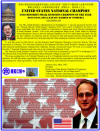 USA Small Business Administration (SBA)
Selected Johnson Choi/HKCHcc
2008 United States
National Champion
USA Small Business Administration (SBA)
Selected Johnson Choi/HKCHcc
2008 United States
National Champion![]()
![]() and follow us
on
and follow us
on
![]()


